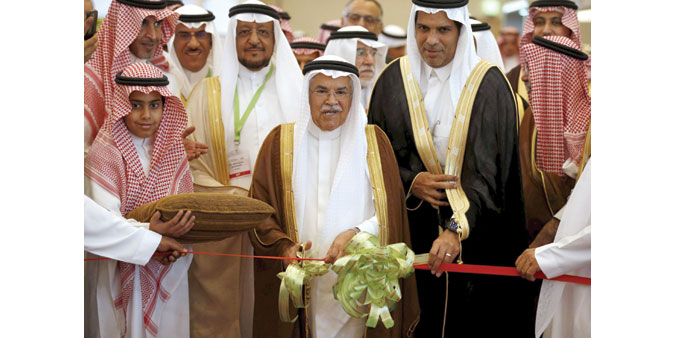Saudi Oil Minister Ali al-Naimi cuts the ribbon during the opening ceremony of a mining conference in Riyadh yesterday.
Agencies
Riyadh
Saudi Arabia is considering raising its heavily subsidised domestic energy prices, the oil minister said yesterday, as the kingdom confronts a record budget deficit caused by falling oil revenues.
“All prices eventually rise,” Ali al-Naimi said on the sidelines of a mining conference.
“Is it under study? ...the answer is ‘Yes’,” he told reporters, without commenting further.
Fuel consumption in Saudi Arabia has risen nine-fold since 1971, making the country one of the largest consumers per capita in the world, according to one study.
Saudi petrol prices are the cheapest in the Gulf and among the world’s lowest. Motorists in the kingdom can fill their tanks for around $6 for a sedan or $18 for an SUV.
Electricity and water are also heavily subsidised.
Last year, a senior World Bank official said the Gulf states spend more than $160bn on energy subsidies annually.
Saudi Arabia accounted for about half that figure.
A 2013 report from the University of California, Berkeley, said the kingdom had the world’s largest fuel subsidies, at about $25bn in 2012.
Oil makes up roughly 90% of government revenue but global prices have dropped by more than half from early last year to less than $50 a barrel, reducing revenue.
The International Monetary Fund projected a budget shortfall this year of 19.5% of Gross Domestic Product, or around $130bn, although the deficit is seen falling in 2016.
It said the kingdom had informed it that it was considering energy price reforms for commercial and industrial users.
Adjusting Saudi petrol and diesel prices to that of levels elsewhere in the Gulf would save $17bn this year.
The reform could also hold back burgeoning consumption, which threatens eventually to erode the amount of Saudi oil available for export. Domestic oil product demand rose 5.1% year-on-year to a record 2.98mn barrels per day in June, according to the Joint Oil Data Initiative.
The United Arab Emirates, another oil producer facing a budget deficit, ended subsidies on fuel in July, in a move expected to conserve billions of dollars annually.
At the conference, Naimi denied that falling oil revenues have given an urgency to developing the kingdom’s other resources, saying there were already significant efforts under way to do so.
“The investment in mining is really substantial,” he said. “You can see the economic activity in the country.”
Phosphates, bauxite and silica are not the products usually associated with Saudi Arabia.
But Naimi and other officials said those and other minerals will play an increasing role as the kingdom tries to diversify its oil-dependent economy.
By 2035, Saudi Arabia wants mining to account for between 4 and 5% percent of GDP, double the current contribution, Sultan bin Jamal Shawli, deputy minister for mineral resources, told the gathering.

